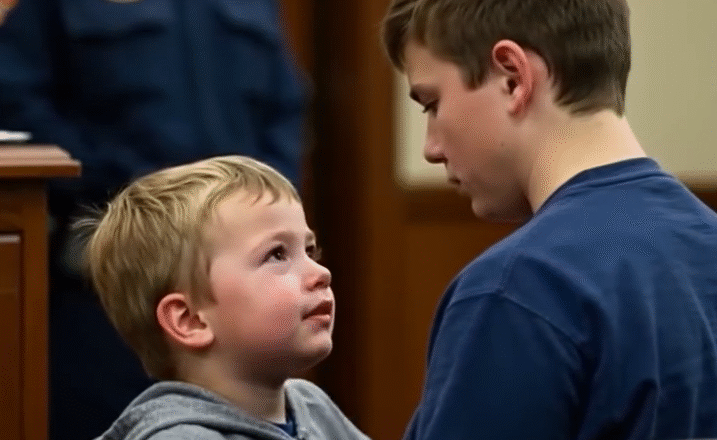The day they took Samuel, I made him a promise: “This isn’t forever.” At age 14, I was left to raise my 6-year-old brother until the system tore us apart.
Eight foster homes, countless court filings, three jobs, and night school—every dollar I earned went toward maintaining a small apartment for him, with his favorite dinosaur sheets washed and a worn-out teddy bear waiting on the pillow.
During our supervised visits he would whisper, “When can I come home?” and I would struggle to answer, “Soon,” praying it wasn’t a lie.
The final custody hearing seemed like our last hope; the social worker called me “too young,” the judge frowned at my paperwork, and Samuel cried quietly in the back row.
And then came the moment that I still remember: the judge adjusted his glasses and began to speak… and time seemed to stop.

My younger brother, Samuel, had always been everything to me. I had protected him, especially when our mother couldn’t. But today, standing in court, I feared the worst—that I would lose him. This hearing was supposed to be my first step toward gaining custody, but the judge’s doubts made it clear that the road would be difficult.
The silence in the room was oppressive. It seemed like everyone was waiting for me to stumble. I clenched my fists, trying to stay calm. Losing Samuel was not an option. Not after everything we had been through.
Francis, a social worker, sat next to me. She looked professional, but her eyes betrayed compassion. “You’re doing everything right, Brad,” she said quietly, “but it’s still not enough.”
Her words stung. Not enough money. Not enough space. Not enough experience. Something was always missing.
I worked double shifts in the warehouse, studied for my GED, gave up sleep—I did everything they asked. “I did everything you asked,” I whispered, my voice shaking.
Francis sighed. “Yes. But there are still obstacles.”
I couldn’t take it anymore. I ran out of the room, the cold air hitting me like a slap. I exhaled, watching my steam disappear into the cold, just as our old life disappeared.
I remembered being six years old and sitting with my mom while she did card tricks. We didn’t have much—just a beat-up deck of cards and an old fan—but those moments were magical.
“Pick one,” she smiled. I chose the five of hearts. She showed it at the top of the deck. “How did you do that?” I asked in amazement.
“A magician never reveals secrets,” she winked.

As I grew older, I realized that her joy was an illusion that disappeared as life dealt us increasingly worse cards.
I went back to my small basement apartment and collapsed onto the couch. My job barely covered the bills, and the state required Samuel to have his own room. But how was I supposed to afford a bigger place?
Then Mrs. Rachel, my landlady, knocked. She came in with cookies and a worried look. “How did it go in court?” she asked.
“They want proof that I can take care of him, as if I didn’t give everything to feed him,” I said in frustration.
She sighed. “Love is one thing, mijo, but the system needs something more substantial.”
I rubbed my temples, feeling helpless. “They say my apartment is too small. I need my own room.”
Mrs. Rachel paused, then shrugged. “Clean up the spare room upstairs. Same rent. Just…don’t burn my house down.”
I blinked. “Really?”
She nodded. “It needs some work, but it’s a real bedroom.”
I couldn’t believe it. This was my chance to prove that Samuel should be with me.
That night I worked hard painting the walls blue, Samuel’s favorite color. It wasn’t luxurious, but it was full of love.
Two days later, Francis came in. She saw the room, but her frown deepened. “Raising a child is about stability, Brad,” she said.
“I know,” I replied, biting my tongue.
She softened. “I’m trying. But you have to prove you can do it.”
I had three weeks, so I redoubled my efforts. Mrs. Rachel introduced me to a lawyer, Mr. Davidson. He said that kinship care was the best option.
Then, the day before the trial, Mrs. Bailey, Samuel’s foster mother, called. “We’ve written a letter to the judge. Samuel should be with you.”
The next day I appeared in court and when it was my turn, I looked the judge straight in the eye.
“I may be young, but I’ve cared for Samuel his whole life. I can give him a home where he’ll feel safe and loved.”
The judge’s silence lasted an eternity, but then he spoke: “The best place for Samuel is with his brother.”
Samuel ran to me and we hugged tightly. It worked. We were finally together.
As we walked out of the courthouse, holding hands, I laughed. “Pizza to celebrate?”
Samuel beamed. “Yes! Pizza!” And for the first time in a long time, I truly believed in the true magic of family
